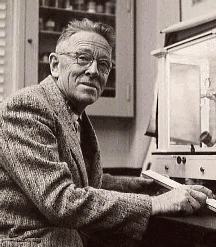 1895-1972
1895-1972
Harold Goss made many contributions to the development of the Department of Animal Science, the Davis campus, and the community of Davis.
He was born in Salt Lake City, Utah. In 1918, he received his BS in Chemistry from the University of California at Berkeley. Harold began his University career as Assistant in Nutrition at Berkeley in 1919. He completed his PhD in Biochemistry at Berkeley in 1929, after which he came to Davis as an Assistant Professor in Animal Husbandry.
Professor Goss played a major role in bringing the biochemical point of view to large animal experimentation. Among his most notable contributions were his demonstrations of the synthesis of B-complex vitamins in the rumen and cecum, the toxicity of molybdenum and its interrelationship with copper, studies on the role of glutathione in growth, and, with Professor Harold Cole, the purification of pregnant mare serum gonadotropin. In 1953 Harold Goss was honored by the Davis faculty as the eleventh Faculty Research Lecturer.
For some thirty years, Harold taught biochemistry. His teaching extended beyond the classroom. He became a counselor to many students and befriended many others as well.
Dr. Goss was active in academia, serving on the graduate council, chairing the Committee on Committees from 1953-54, and serving as acting chairman of the Department of Animal Husbandry in 1956-57. He was a member of the American Institute of Nutrition, the Society for Experimental Biology and Medicine, the American Society of Biological Chemists, and the Society of Sigma Xi. In addition, he was active in the Davis Community Church and the Davis Rotary Club.
Harold Goss gained international renown for his mineral and vitamin studies but, more importantly, a host of graduate students and colleagues are indebted to him for his helpfulness in the biochemical aspects of their researches. Finally, the warmth with which Harold and his wife, Hilda, welcomed students into their home did much to foster the tradition of Davis as the friendly campus.
